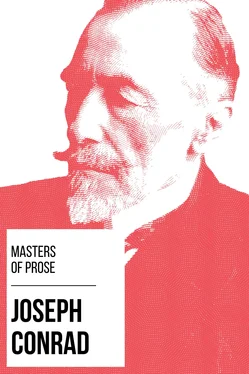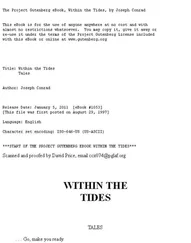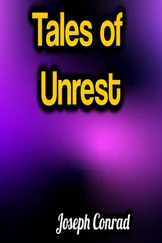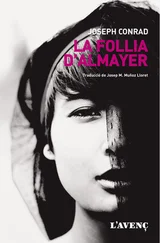There were pages of MS. on the table and under the table, a batch of typed copy on a chair, single leaves had fluttered away into distant corners; there were there living pages, pages scored and wounded, dead pages that would be burned at the end of the day—the litter of a cruel battle-field, of a long, long, and desperate fray. Long! I suppose I went to bed sometimes, and got up the same number of times. Yes, I suppose I slept, and ate the food put before me, and talked connectedly to my household on suitable occasions. But I had never been aware of the even flow of daily life, made easy and noiseless for me by a silent, watchful, tireless affection. Indeed, it seemed to me that I had been sitting at that table surrounded by the litter of a desperate fray for days and nights on end. It seemed so, because of the intense weariness of which that interruption had made me aware—the awful disenchantment of a mind realizing suddenly the futility of an enormous task, joined to a bodily fatigue such as no ordinary amount of fairly heavy physical labour could ever account for. I have carried bags of wheat on my back, bent almost double under a ship's deck-beams, from six in the morning till six in the evening (with an hour and a half off for meals), so I ought to know.
And I love letters. I am jealous of their honour and concerned for the dignity and comeliness of their service. I was, most likely, the only writer that neat lady had ever caught in the exercise of his craft, and it distressed me not to be able to remember when it was that I dressed myself last, and how. No doubt that would be all right in essentials. The fortune of the house included a pair of gray-blue watchful eyes that would see to that. But I felt, somehow, as grimy as a Costaguana lepero after a day's fighting in the streets, rumpled all over and dishevelled down to my very heels. And I am afraid I blinked stupidly. All this was bad for the honour of letters and the dignity of their service. Seen indistinctly through the dust of my collapsed universe, the good lady glanced about the room with a slightly amused serenity. And she was smiling. What on earth was she smiling at? She remarked casually:
“I am afraid I interrupted you.”
“Not at all.”
She accepted the denial in perfect good faith. And it was strictly true. Interrupted—indeed! She had robbed me of at least twenty lives, each infinitely more poignant and real than her own, because informed with passion, possessed of convictions, involved in great affairs created out of my own substance for an anxiously meditated end.
She remained silent for a while, then said, with a last glance all round at the litter of the fray:
“And you sit like this here writing your—your . . .”
“I—what? Oh, yes! I sit here all day.”
“It must be perfectly delightful.”
I suppose that, being no longer very young, I might have been on the verge of having a stroke; but she had left her dog in the porch, and my boy's dog, patrolling the field in front, had espied him from afar. He came on straight and swift like a cannon-ball, and the noise of the fight, which burst suddenly upon our ears, was more than enough to scare away a fit of apoplexy. We went out hastily and separated the gallant animals. Afterward I told the lady where she would find my wife—just round the corner, under the trees. She nodded and went off with her dog, leaving me appalled before the death and devastation she had lightly made—and with the awfully instructive sound of the word “delightful” lingering in my ears.
Nevertheless, later on, I duly escorted her to the field gate. I wanted to be civil, of course (what are twenty lives in a mere novel that one should be rude to a lady on their account?), but mainly, to adopt the good, sound Ollendorffian style, because I did not want the dog of the general's daughter to fight again (encore) with the faithful dog of my infant son (mon petit garcon).—Was I afraid that the dog of the general's daughter would be able to overcome (vaincre) the dog of my child?—No, I was not afraid. . . . But away with the Ollendorff method. However appropriate and seemingly unavoidable when I touch upon anything appertaining to the lady, it is most unsuitable to the origin, character, and history of the dog; for the dog was the gift to the child from a man for whom words had anything but an Ollendorffian value, a man almost childlike in the impulsive movements of his untutored genius, the most single-minded of verbal impressionists, using his great gifts of straight feeling and right expression with a fine sincerity and a strong if, perhaps, not fully conscious conviction. His art did not obtain, I fear, all the credit its unsophisticated inspiration deserved. I am alluding to the late Stephen Crane, the author of “The Red Badge of Courage,” a work of imagination which found its short moment of celebrity in the last decade of the departed century. Other books followed. Not many. He had not the time. It was an individual and complete talent which obtained but a grudging, somewhat supercilious recognition from the world at large. For himself one hesitates to regret his early death. Like one of the men in his “Open Boat,” one felt that he was of those whom fate seldom allows to make a safe landing after much toil and bitterness at the oar. I confess to an abiding affection for that energetic, slight, fragile, intensely living and transient figure. He liked me, even before we met, on the strength of a page or two of my writing, and after we had met I am glad to think he liked me still. He used to point out to me with great earnestness, and even with some severity, that “a boy ought to have a dog.” I suspect that he was shocked at my neglect of parental duties.
Ultimately it was he who provided the dog. Shortly afterward, one day, after playing with the child on the rug for an hour or so with the most intense absorption, he raised his head and declared firmly, “I shall teach your boy to ride.” That was not to be. He was not given the time.
But here is the dog—an old dog now. Broad and low on his bandy paws, with a black head on a white body and a ridiculous black spot at the other end of him, he provokes, when he walks abroad, smiles not altogether unkind. Grotesque and engaging in the whole of his appearance, his usual attitudes are meek, but his temperament discloses itself unexpectedly pugnacious in the presence of his kind. As he lies in the firelight, his head well up, and a fixed, far away gaze directed at the shadows of the room, he achieves a striking nobility of pose in the calm consciousness of an unstained life. He has brought up one baby, and now, after seeing his first charge off to school, he is bringing up another with the same conscientious devotion, but with a more deliberate gravity of manner, the sign of greater wisdom and riper experience, but also of rheumatism, I fear. From the morning bath to the evening ceremonies of the cot, you attend the little two-legged creature of your adoption, being yourself treated in the exercise of your duties with every possible regard, with infinite consideration, by every person in the house—even as I myself am treated; only you deserve it more.
The general's daughter would tell you that it must be “perfectly delightful.”
Aha! old dog. She never heard you yelp with acute pain (it's that poor left ear) the while, with incredible self-command, you preserve a rigid immobility for fear of overturning the little two-legged creature. She has never seen your resigned smile when the little two-legged creature, interrogated, sternly, “What are you doing to the good dog?” answers, with a wide, innocent stare: “Nothing. Only loving him, mamma dear!”
The general's daughter does not know the secret terms of self-imposed tasks, good dog, the pain that may lurk in the very rewards of rigid self-command. But we have lived together many years. We have grown older, too; and though our work is not quite done yet we may indulge now and then in a little introspection before the fire—meditate on the art of bringing up babies and on the perfect delight of writing tales where so many lives come and go at the cost of one which slips imperceptibly away.
Читать дальше












